Hot springs & geothermal pools in Iceland: your guide
August 9, 2022
Hot springs & geothermal pools in Iceland: your guide
August 9, 2022
Sitting atop the Mid-Atlantic Rift, magma rises up from the shifting tectonic plates in Iceland to create the perfect conditions for volcanic activity. The land of fire and ice is filled with erupting geysers, hot springs and steaming rivers and lakes. From the thermally-heated sports pools and adventure water parks around Reykjavik to the natural hot springs of remote mountain valleys, there are countless places to enjoy warm-water bathing. For the ultimate hot spring and geothermal pool experience in Iceland, book a tour with Reykjavik Excursions.
What is a hot spring?
Thanks to the island’s volcanic activity, underground water is heated by molten rock close to the Earth’s surface or from hot rocks much deeper down in the Earth’s crust, reaching the surface through fissures. With so much volcanic and seismic activity on the island the scene is changing all the time. The last hot spring emerged in 2014 after the Holuhraun eruption in a remote corner of Northern Iceland. It’s a magical sight to see the thermally heated water steaming as it hits the cold air. Slip into a pool encircled by mountains, edged by sea or tucked into a river valley and feel the water warm your body even when it’s freezing outside.
Can you swim in Iceland’s hot springs?
Absolutely. With so much thermally heated water, bathing is one of the most popular leisure activities for residents. It’s a must for visiting tourists too. There are approaching 50 natural springs on the island and dozens of thermally heated public pools. Tourists and locals are spoiled for choice. Many of the public pools are outside and open year round. Reykjavik and its surrounds has 17 geothermal swimming pools alone. Some of them are in sports centres; some have play parks, hot tubs, saunas, steam rooms and plunge pools; others have bars, cafes and restaurants. The Blue Lagoon is the most famous geothermal spa in Iceland, but there are many more sites on the famous Golden Circle loop in southwest Iceland and all around the Ring Road circling the entire country.
Are hot springs in Iceland free?
Some of the hot springs in the mountains and on the plateaus are free to use - temperature permitting - but they can lack facilities such as showers and changing cubicles. If you’re on a budget, hike up to Reykjadular’s ‘Steam Valley’, a hot spring river less than an hour from the capital. For a unique beach experience, check out Nauthólsvík, just 10 minutes from the centre of Reykjavik, free in the summer months. It’s worth treating yourself, however, to one of the state-of-the-art spa hotels or purpose-built thermal pools with all facilities on hand.
How hot are the hot springs in Iceland?
Some of the springs are lukewarm, others are like a pleasantly hot bath. They are perfectly safe to swim in, health permitting. Hot tubs tend to be between 38 °C - 40 °C, rising to 44 °C; pools between 27°C - 30°C, still warm but cool enough to swim laps. Some natural hot springs give you a safe and comfortable dip, while others are scalding hot and out of bounds. Stick to the approved sites and you can’t go wrong. Check out the thermal spas and natural springs listed below, single out your favourites and factor them into your itinerary.
Are hot springs in Iceland safe?
Some hot springs are far too hot to bathe in. The springs around the famous Geysir on the Golden Circle loop are fenced off for a reason: their temperatures can reach 100°C. Always swim in designated hot springs and purpose-built spas to stay safe.
Popular hot spring spas in Iceland
Hvammsvík Hot Springs
Nestled amidst the serene landscapes of Iceland, Hvammsvík Hot Springs beckons with an allure that's impossible to resist. This pristine geothermal treasure combines ancient magic with modern luxury, promising an experience you won't forget. Only a 45-minute drive from the bustling heart of Reykjavík, Hvammsvík is the epitome of an Icelandic escape. Learn more about this unique place.
Sky Lagoon
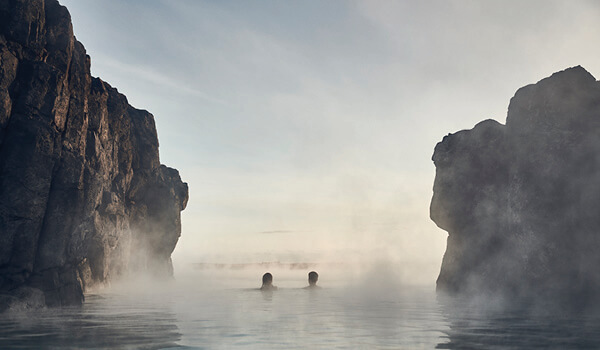
Sitting on the coast just seven kilometres from the capital, the views from these thermal baths are to die for. Luxuriate in the lagoon where sky meets sea and the infinity edge of the pool merges with the Atlantic Ocean. Swim among the boulders in the warm water and re-energise in the icy mist showers and cold plunge pool. At this wellness centre you can exfoliate with a sea-salt body scrub, take in the sea views and dramatic rocky coastline from the sauna and hydrate in the steam room. It’s an unforgettable experience. Learn more in ‘Your complete guide to Iceland’s Sky Lagoon’.
Laugarvatn Fontana Geothermal Bath
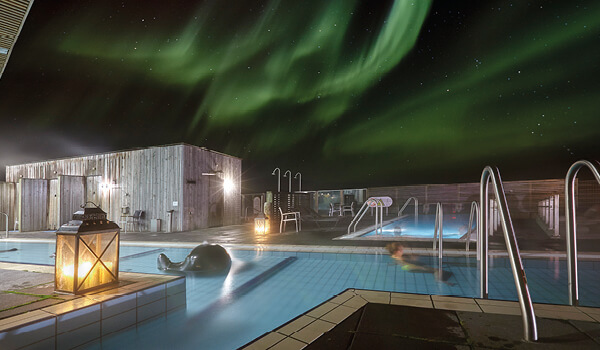
East of Thingvellir, the site of the ancient outdoor parliament on the Golden Circle route, you’ll find Laugarvatn Fontana, a sleek spa complex edging the lake of Laugarvatn. Join a tour and soak in three mineral baths of varying sizes and temperatures. Chill in the steam baths and enjoy the views overlooking the lake from the elevated hot tub. For a unique Icelandic experience, combine a trip of the Golden Circle with the baths and a walk to a ‘natural bakery’. Learn how local rye bread is slowly cooked in the geothermally heated ground. Alternatively, go on a hunt for the Northern Lights under the expertise of local guides after leaving the baths and before returning to Reykjavik.
Secret Lagoon
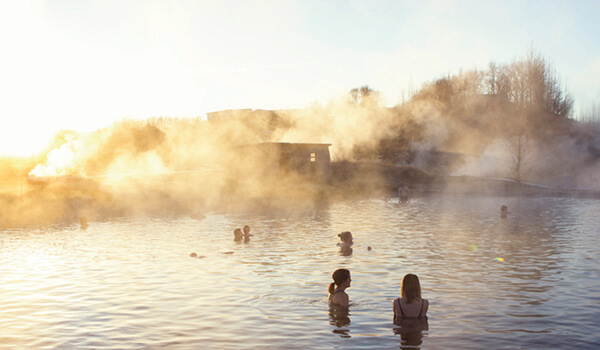
Who can resist a secret lagoon? Just off the Golden Circle route near Flúðir, the Secret Lagoon is Iceland’s oldest geothermal pool, created in 1891. It fell into obscurity until it was rediscovered in the 21st century. It may not be so secret anymore but it still has the feel of a forgotten place in the mists, encircled by a rugged terrain of moss and rock. After showering, amble along the boardwalks and pathways and enjoy the displays from the little geyser close by.
Blue Lagoon
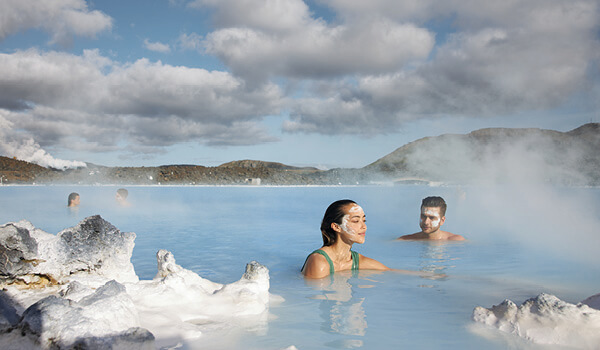
Currently closed until through the 15th of November.
The most famous hot-spring spa of them all, the Blue Lagoon is revered for its gorgeous milky-blue water, health-giving minerals and exceptional facilities. The National Geographic lists it in their ‘Top 25 Wonders of the World.’ As you soak in the steaming waters surrounded by hills, you’ll see why. Around the lagoon, there are several restaurants, cafes, massage areas and a hotel. There’s even an in-water bar. Close to the capital and airport on the Reykjanes Peninsula, it’s a special treat on arrival or departure - but book well in advance. Find out more in this handy blog, ‘Your complete guide to the Blue Lagoon in Iceland’.
Vök Baths
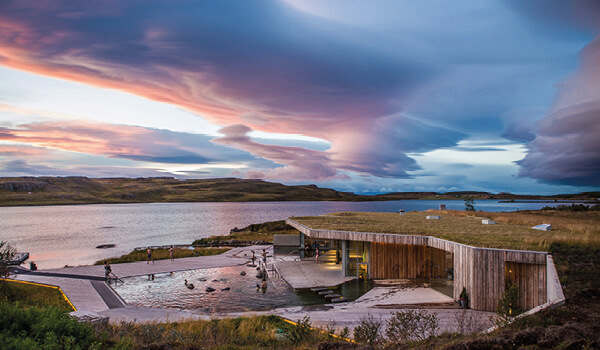
Found on the banks of Lake Urriðavatn in East Iceland, Vök Baths has been lovingly created for the ultimate geothermal experience. The glass-fronted contemporary building, with its eco-friendly turf roof, houses a bar, steam room, cold tunnel and cafe. Out on the lake there’s a series of floating pools surrounded by boardwalks. The entry ticket includes a healthy herbal tea brewed from the spring water. This is a place to restore mind and body.
Geosea
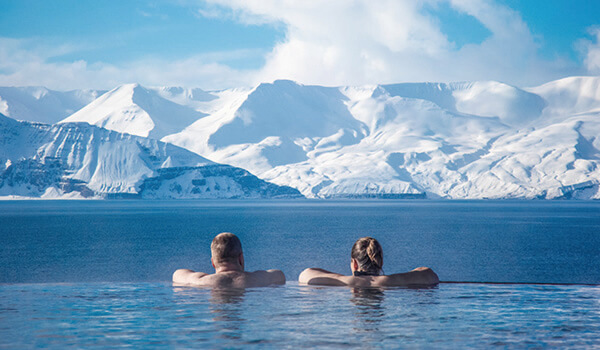
Close to the small town of Húsavík on the isolated north coast of Iceland, you’ll find Geosea where blue-on-blue meets at the edge of the infinity pool overlooking Skjálfandi Bay with the Arctic Circle beyond. Experience snow-covered hills and rocky sea-cliffs. Enjoy the swim-up bar and relax with a drink in the mineral-rich seawater as you do a spot of whale watching.
Forest Lagoon - Skógarböðin
At the head of Eyjafjörður, one of the longest fjords in Iceland, Forest Lagoon is surrounded by nature, even though it’s just a three-kilometre drive from Akureyri, the capital of the north. The water and forest surrounding the lagoon makes it a truly healing environment. Enjoy the two infinity pools and swim-up bars, breathe in the pine, clear your pores in the sauna and feel invigorated by the cold tub.
Mývatn Nature Baths
Northern Iceland has its very own Blue Lagoon at Mývatn. Bask in the aqua-blue water, grab a drink from the swim-up bar and watch the sun set. Finish in the steam room, where the steam rises through vents from the geothermally heated earth beneath. The nature baths are glorious through all four seasons. Enjoy them on one of the long summer days when the sky barely darkens this far north. Savour the golden hues of autumn. Revel in winter snows. Thrill at the patchwork of whites and greens heralding spring.
Giljaböð - Húsafell Canyon Baths
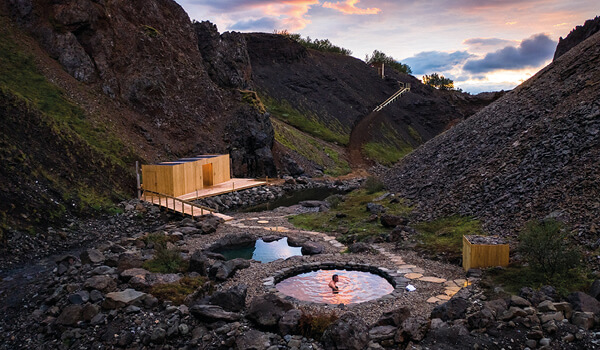
Of all the hot-spring locations, Húsafell Canyon captures the extraordinary otherworldliness of Iceland. Join a bus tour from Reykjavík and guided walk to the baths to experience the wild beauty of the highlands. With your guide, hike through a rugged volcanic canyon, passing a two-tiered waterfall. Drop down the wooden stairway to the circular stone-edged hot springs surrounded by great walls of rock. Soak in the warm waters - and the majesty and solitude of this awe-inspiring landscape.
Krauma
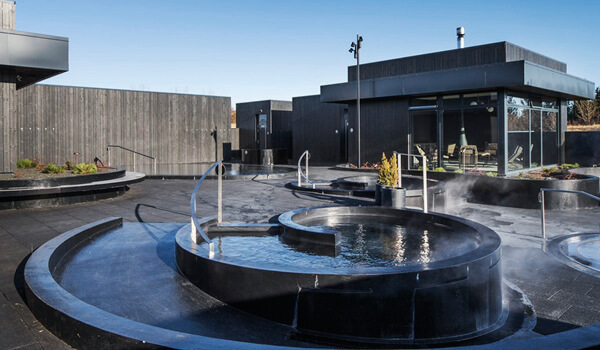
In west Iceland the cold water from the island’s smallest glacier - Rauðsgil - is mixed with the 100°C water of Deildartunguhver to create the perfect temperature. Choose from five geothermal baths, two saunas, a cold tub and relaxation room. The restaurant food here is created with fresh farm products. Finish a relaxing day with a meal then a drink from the bar, taking in the superb views of Iceland’s most powerful hot spring. Find out more about Krauma natural geothermal baths here.
Popular natural hot springs
Landmannalaugar hot spring
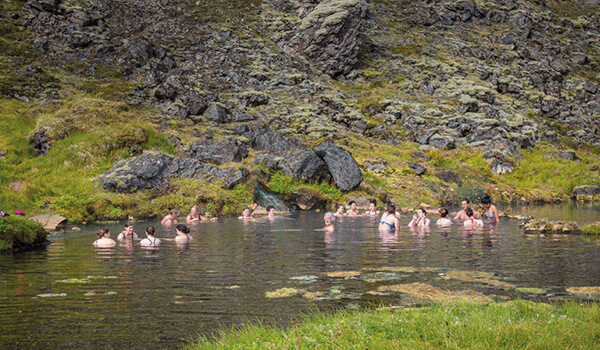
What a location! Join a tour or take the bus to reach this isolated site, only accessible in the summer months. If you’re hiring a four-wheel drive, you’ll have to ford rivers and negotiate unmade roads. It’s a long drive but well worth the effort. All around are sculpted mountains in muted ochre tones. It’s an enchanting landscape. After a hard day’s hiking in the highlands, ease yourself into the warm water and breathe out. Check out our Highland bus tour to Landmannalaugar.
Reykjadalur hot spring
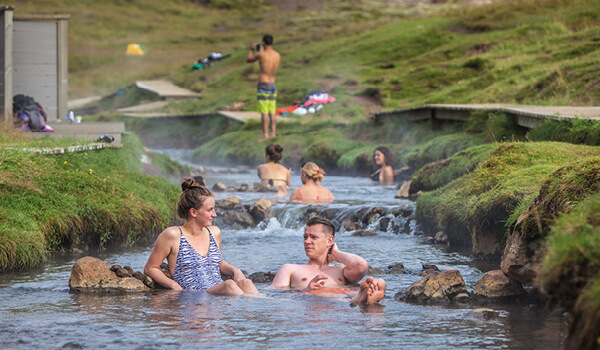
From the trailhead it’s a 3.5km hike to the ‘hot river’ in ‘Steam Valley’. As you climb in the mountains, fumaroles bubble and steam. This is a wild and otherworldly landscape. After an ascent of 200 metres, the wooden changing screens come into view. Here the water is the perfect temperature for bathing. Slip into the shallow waters and feel your aching muscles loosen after the uphill trek to this wonderful spot surrounded by nature.
Popular geothermal pools in Iceland
Seljavallalaug
Only in Iceland would you find a 25-metre-long pool in such isolation. No public transport travels this route, and there’s a hike up from the car park. But if you can brave the algae and cool 20°C water, you’ll be rewarded with breath-taking views. Waterfalls cascade off the snow-capped fells and a river burbles alongside the pool. The rectangular pool headed by changing rooms is an incongruous sight in this lonely spot in southern Iceland. One of the island’s oldest pools, it was built in 1923 and has a pleasing simplicity to it. After the 2010 eruption of Eyjafjallajökull, the pool was filled with ash and had to be cleared out by volunteers. You’ll feel the power of nature here.
Krossneslaug
The small pool is located in one of Iceland’s wildest and most beautiful corners - in the remote Strandir region of the Westfjords. The vivid blue water of the geothermal pool has the feel of an infinity pool, constructed right beside the pebble beach and sea. Keep your eyes peeled for humpback whales and dolphins. Due to its isolated spot, the pool is only accessible in the summer months and requires an off-road vehicle for the long drive in.
Swimming pools in Reykjavík
From downtown Reykjavik to the settlements that surround the capital, there are tens of swimming pools to enjoy. Check out Sundhöllin, the oldest pool in the centre. From the sundeck there are great views of the iconic Hallgrímskirkja Lutheran church. Arbaejarlaug, out in the suburbs, has a lovely outlook over the Elliðarárdalur valley. Swim from the solarium into the outdoor pool with waterslide, fountain, bridge and hot-tub area. Close to the campsite, Laugardalslaug has one indoor and two outdoor pools, several hot tubs, water slides and a beach volleyball court.
Hot spring and geothermal pool etiquette
There are just a few simple rules to remember. Don’t wear shoes in the changing area and shower thoroughly (without clothing) before entering the pool. Ask for the owner’s permission if the hot spring is on private land. Enjoy a beer but don’t use glassware. Leave the site pristine, taking all your rubbish with you. There should be no trace of your visit.
Best time to visit hot springs in Iceland
You can enjoy Iceland’s hot springs and thermal pools at any time of year as most of them are open year-round. Swim under the Midnight Sun or in the darkness of Winter Solstice, surrounded by snow. Watch the sun rise or set and marvel at the northern lights. If it’s winter, choose the hotter springs to counteract the freezing air temperatures and wrap up warm afterwards. The most invigorating experience of all is to sit in a hot spring during a snow blizzard or rainstorm. But whatever the time of year and weather conditions, it’s a special experience.
Now it’s time to start planning. From the tantalising list of Iceland’s finest hot springs and thermal pools, you can draw up your bucket list. Allow enough time to experience the best hot springs, spas and geothermal pools all over Iceland, then book your tour with Reykjavik Excursions to ensure a stress-free trip. Start saving for that once-in-a-lifetime trip and factor in a variety of hot spring experiences: a state-of-the-art spa hotel with a menu of wellness programmes, a steaming infinity pool by the sea or a natural hot spring surrounded by pure wilderness. They’re all waiting.
Tours in the spotlight
REYKJAVIK EXCURSIONS BLOG
Get inspired! Information and tips and must see places in Iceland, fun facts, customs and more.
The Silver Circle of West Iceland - Your Guide
You’ve heard of the Golden Circle, but here’s why you should head to Iceland’s western region to explore the msytical Silver Circle tour route.
Read BlogHot springs & geothermal pools in Iceland: your guide
August 9, 2022
Hot springs & geothermal pools in Iceland: your guide
August 9, 2022
Sitting atop the Mid-Atlantic Rift, magma rises up from the shifting tectonic plates in Iceland to create the perfect conditions for volcanic activity. The land of fire and ice is filled with erupting geysers, hot springs and steaming rivers and lakes. From the thermally-heated sports pools and adventure water parks around Reykjavik to the natural hot springs of remote mountain valleys, there are countless places to enjoy warm-water bathing. For the ultimate hot spring and geothermal pool experience in Iceland, book a tour with Reykjavik Excursions.
What is a hot spring?
Thanks to the island’s volcanic activity, underground water is heated by molten rock close to the Earth’s surface or from hot rocks much deeper down in the Earth’s crust, reaching the surface through fissures. With so much volcanic and seismic activity on the island the scene is changing all the time. The last hot spring emerged in 2014 after the Holuhraun eruption in a remote corner of Northern Iceland. It’s a magical sight to see the thermally heated water steaming as it hits the cold air. Slip into a pool encircled by mountains, edged by sea or tucked into a river valley and feel the water warm your body even when it’s freezing outside.
Can you swim in Iceland’s hot springs?
Absolutely. With so much thermally heated water, bathing is one of the most popular leisure activities for residents. It’s a must for visiting tourists too. There are approaching 50 natural springs on the island and dozens of thermally heated public pools. Tourists and locals are spoiled for choice. Many of the public pools are outside and open year round. Reykjavik and its surrounds has 17 geothermal swimming pools alone. Some of them are in sports centres; some have play parks, hot tubs, saunas, steam rooms and plunge pools; others have bars, cafes and restaurants. The Blue Lagoon is the most famous geothermal spa in Iceland, but there are many more sites on the famous Golden Circle loop in southwest Iceland and all around the Ring Road circling the entire country.
Are hot springs in Iceland free?
Some of the hot springs in the mountains and on the plateaus are free to use - temperature permitting - but they can lack facilities such as showers and changing cubicles. If you’re on a budget, hike up to Reykjadular’s ‘Steam Valley’, a hot spring river less than an hour from the capital. For a unique beach experience, check out Nauthólsvík, just 10 minutes from the centre of Reykjavik, free in the summer months. It’s worth treating yourself, however, to one of the state-of-the-art spa hotels or purpose-built thermal pools with all facilities on hand.
How hot are the hot springs in Iceland?
Some of the springs are lukewarm, others are like a pleasantly hot bath. They are perfectly safe to swim in, health permitting. Hot tubs tend to be between 38 °C - 40 °C, rising to 44 °C; pools between 27°C - 30°C, still warm but cool enough to swim laps. Some natural hot springs give you a safe and comfortable dip, while others are scalding hot and out of bounds. Stick to the approved sites and you can’t go wrong. Check out the thermal spas and natural springs listed below, single out your favourites and factor them into your itinerary.
Are hot springs in Iceland safe?
Some hot springs are far too hot to bathe in. The springs around the famous Geysir on the Golden Circle loop are fenced off for a reason: their temperatures can reach 100°C. Always swim in designated hot springs and purpose-built spas to stay safe.
Popular hot spring spas in Iceland
Hvammsvík Hot Springs
Nestled amidst the serene landscapes of Iceland, Hvammsvík Hot Springs beckons with an allure that's impossible to resist. This pristine geothermal treasure combines ancient magic with modern luxury, promising an experience you won't forget. Only a 45-minute drive from the bustling heart of Reykjavík, Hvammsvík is the epitome of an Icelandic escape. Learn more about this unique place.
Sky Lagoon

Sitting on the coast just seven kilometres from the capital, the views from these thermal baths are to die for. Luxuriate in the lagoon where sky meets sea and the infinity edge of the pool merges with the Atlantic Ocean. Swim among the boulders in the warm water and re-energise in the icy mist showers and cold plunge pool. At this wellness centre you can exfoliate with a sea-salt body scrub, take in the sea views and dramatic rocky coastline from the sauna and hydrate in the steam room. It’s an unforgettable experience. Learn more in ‘Your complete guide to Iceland’s Sky Lagoon’.
Laugarvatn Fontana Geothermal Bath

East of Thingvellir, the site of the ancient outdoor parliament on the Golden Circle route, you’ll find Laugarvatn Fontana, a sleek spa complex edging the lake of Laugarvatn. Join a tour and soak in three mineral baths of varying sizes and temperatures. Chill in the steam baths and enjoy the views overlooking the lake from the elevated hot tub. For a unique Icelandic experience, combine a trip of the Golden Circle with the baths and a walk to a ‘natural bakery’. Learn how local rye bread is slowly cooked in the geothermally heated ground. Alternatively, go on a hunt for the Northern Lights under the expertise of local guides after leaving the baths and before returning to Reykjavik.
Secret Lagoon

Who can resist a secret lagoon? Just off the Golden Circle route near Flúðir, the Secret Lagoon is Iceland’s oldest geothermal pool, created in 1891. It fell into obscurity until it was rediscovered in the 21st century. It may not be so secret anymore but it still has the feel of a forgotten place in the mists, encircled by a rugged terrain of moss and rock. After showering, amble along the boardwalks and pathways and enjoy the displays from the little geyser close by.
Blue Lagoon

Currently closed until through the 15th of November.
The most famous hot-spring spa of them all, the Blue Lagoon is revered for its gorgeous milky-blue water, health-giving minerals and exceptional facilities. The National Geographic lists it in their ‘Top 25 Wonders of the World.’ As you soak in the steaming waters surrounded by hills, you’ll see why. Around the lagoon, there are several restaurants, cafes, massage areas and a hotel. There’s even an in-water bar. Close to the capital and airport on the Reykjanes Peninsula, it’s a special treat on arrival or departure - but book well in advance. Find out more in this handy blog, ‘Your complete guide to the Blue Lagoon in Iceland’.
Vök Baths

Found on the banks of Lake Urriðavatn in East Iceland, Vök Baths has been lovingly created for the ultimate geothermal experience. The glass-fronted contemporary building, with its eco-friendly turf roof, houses a bar, steam room, cold tunnel and cafe. Out on the lake there’s a series of floating pools surrounded by boardwalks. The entry ticket includes a healthy herbal tea brewed from the spring water. This is a place to restore mind and body.
Geosea

Close to the small town of Húsavík on the isolated north coast of Iceland, you’ll find Geosea where blue-on-blue meets at the edge of the infinity pool overlooking Skjálfandi Bay with the Arctic Circle beyond. Experience snow-covered hills and rocky sea-cliffs. Enjoy the swim-up bar and relax with a drink in the mineral-rich seawater as you do a spot of whale watching.
Forest Lagoon - Skógarböðin
At the head of Eyjafjörður, one of the longest fjords in Iceland, Forest Lagoon is surrounded by nature, even though it’s just a three-kilometre drive from Akureyri, the capital of the north. The water and forest surrounding the lagoon makes it a truly healing environment. Enjoy the two infinity pools and swim-up bars, breathe in the pine, clear your pores in the sauna and feel invigorated by the cold tub.
Mývatn Nature Baths
Northern Iceland has its very own Blue Lagoon at Mývatn. Bask in the aqua-blue water, grab a drink from the swim-up bar and watch the sun set. Finish in the steam room, where the steam rises through vents from the geothermally heated earth beneath. The nature baths are glorious through all four seasons. Enjoy them on one of the long summer days when the sky barely darkens this far north. Savour the golden hues of autumn. Revel in winter snows. Thrill at the patchwork of whites and greens heralding spring.
Giljaböð - Húsafell Canyon Baths

Of all the hot-spring locations, Húsafell Canyon captures the extraordinary otherworldliness of Iceland. Join a bus tour from Reykjavík and guided walk to the baths to experience the wild beauty of the highlands. With your guide, hike through a rugged volcanic canyon, passing a two-tiered waterfall. Drop down the wooden stairway to the circular stone-edged hot springs surrounded by great walls of rock. Soak in the warm waters - and the majesty and solitude of this awe-inspiring landscape.
Krauma

In west Iceland the cold water from the island’s smallest glacier - Rauðsgil - is mixed with the 100°C water of Deildartunguhver to create the perfect temperature. Choose from five geothermal baths, two saunas, a cold tub and relaxation room. The restaurant food here is created with fresh farm products. Finish a relaxing day with a meal then a drink from the bar, taking in the superb views of Iceland’s most powerful hot spring. Find out more about Krauma natural geothermal baths here.
Popular natural hot springs
Landmannalaugar hot spring

What a location! Join a tour or take the bus to reach this isolated site, only accessible in the summer months. If you’re hiring a four-wheel drive, you’ll have to ford rivers and negotiate unmade roads. It’s a long drive but well worth the effort. All around are sculpted mountains in muted ochre tones. It’s an enchanting landscape. After a hard day’s hiking in the highlands, ease yourself into the warm water and breathe out. Check out our Highland bus tour to Landmannalaugar.
Reykjadalur hot spring

From the trailhead it’s a 3.5km hike to the ‘hot river’ in ‘Steam Valley’. As you climb in the mountains, fumaroles bubble and steam. This is a wild and otherworldly landscape. After an ascent of 200 metres, the wooden changing screens come into view. Here the water is the perfect temperature for bathing. Slip into the shallow waters and feel your aching muscles loosen after the uphill trek to this wonderful spot surrounded by nature.
Popular geothermal pools in Iceland
Seljavallalaug
Only in Iceland would you find a 25-metre-long pool in such isolation. No public transport travels this route, and there’s a hike up from the car park. But if you can brave the algae and cool 20°C water, you’ll be rewarded with breath-taking views. Waterfalls cascade off the snow-capped fells and a river burbles alongside the pool. The rectangular pool headed by changing rooms is an incongruous sight in this lonely spot in southern Iceland. One of the island’s oldest pools, it was built in 1923 and has a pleasing simplicity to it. After the 2010 eruption of Eyjafjallajökull, the pool was filled with ash and had to be cleared out by volunteers. You’ll feel the power of nature here.
Krossneslaug
The small pool is located in one of Iceland’s wildest and most beautiful corners - in the remote Strandir region of the Westfjords. The vivid blue water of the geothermal pool has the feel of an infinity pool, constructed right beside the pebble beach and sea. Keep your eyes peeled for humpback whales and dolphins. Due to its isolated spot, the pool is only accessible in the summer months and requires an off-road vehicle for the long drive in.
Swimming pools in Reykjavík
From downtown Reykjavik to the settlements that surround the capital, there are tens of swimming pools to enjoy. Check out Sundhöllin, the oldest pool in the centre. From the sundeck there are great views of the iconic Hallgrímskirkja Lutheran church. Arbaejarlaug, out in the suburbs, has a lovely outlook over the Elliðarárdalur valley. Swim from the solarium into the outdoor pool with waterslide, fountain, bridge and hot-tub area. Close to the campsite, Laugardalslaug has one indoor and two outdoor pools, several hot tubs, water slides and a beach volleyball court.
Hot spring and geothermal pool etiquette
There are just a few simple rules to remember. Don’t wear shoes in the changing area and shower thoroughly (without clothing) before entering the pool. Ask for the owner’s permission if the hot spring is on private land. Enjoy a beer but don’t use glassware. Leave the site pristine, taking all your rubbish with you. There should be no trace of your visit.
Best time to visit hot springs in Iceland
You can enjoy Iceland’s hot springs and thermal pools at any time of year as most of them are open year-round. Swim under the Midnight Sun or in the darkness of Winter Solstice, surrounded by snow. Watch the sun rise or set and marvel at the northern lights. If it’s winter, choose the hotter springs to counteract the freezing air temperatures and wrap up warm afterwards. The most invigorating experience of all is to sit in a hot spring during a snow blizzard or rainstorm. But whatever the time of year and weather conditions, it’s a special experience.
Now it’s time to start planning. From the tantalising list of Iceland’s finest hot springs and thermal pools, you can draw up your bucket list. Allow enough time to experience the best hot springs, spas and geothermal pools all over Iceland, then book your tour with Reykjavik Excursions to ensure a stress-free trip. Start saving for that once-in-a-lifetime trip and factor in a variety of hot spring experiences: a state-of-the-art spa hotel with a menu of wellness programmes, a steaming infinity pool by the sea or a natural hot spring surrounded by pure wilderness. They’re all waiting.
Tours in the spotlight
REYKJAVIK EXCURSIONS BLOG
Get inspired! Information and tips and must see places in Iceland, fun facts, customs and more.
The Silver Circle of West Iceland - Your Guide
You’ve heard of the Golden Circle, but here’s why you should head to Iceland’s western region to explore the msytical Silver Circle tour route.
Read Blog